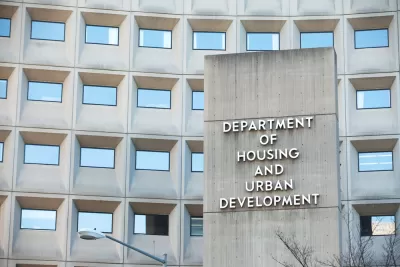A former housing and urban development secretary and a professor of sociology oppose the Trump administration's proposed changes to the Affirmatively Furthering Fair Housing rule.

Shaun Donovan, former secretary of the U.S. Department of Housing and Urban Developer, writes an opinion piece for the New York Times to opposed proposed changes to the Affirmatively Furthering fair Housing rule, announced the Trump administration in January 2020.
Donovan explains the key terms in the contemporary debate over fair housing—disparate impact and affirmatively furthering fair housing—and the progress made under the Obama administration to implement policies to address both:
At HUD, I codified and strengthened these principles. In 2013, the agency issued a formal disparate impact regulation based on decades of unanimous judicial consensus. And in the most important civil rights decision involving housing in a generation, the Supreme Court upheld the disparate impact principle in 2015, recognizing it as consistent with the “central purpose” of the Fair Housing Act. I also began improving HUD’s approach to affirmatively furthering fair housing and my successor, Julián Castro, completed it with a regulation in 2015.
Donovan's purpose in writing the opinion piece is to oppose changes proposed by the Trump administration to "gut" disparate impact standards and "fundamentally undermine" affirmatively furthering standards.
Donovan's opposition to the Trump administration's proposed changes is echoed in an opinion piece written by Gregory D. Squires, professor of Sociology and Public Policy and Public Administration at George Washington University, and published by American Banker, which calls the proposed actions "yet another significant step backward."
"As for its new proposal, HUD should simply scrap it. That would advance the agency’s efforts to fulfill its mandate to make fair housing a reality and lead to the balanced living patterns envisioned when the Fair Housing Act was passed," concludes the editorial.
FULL STORY: The Trump Administration Is Clearing the Way for Housing Discrimination

Planetizen Federal Action Tracker
A weekly monitor of how Trump’s orders and actions are impacting planners and planning in America.

Maui's Vacation Rental Debate Turns Ugly
Verbal attacks, misinformation campaigns and fistfights plague a high-stakes debate to convert thousands of vacation rentals into long-term housing.

Restaurant Patios Were a Pandemic Win — Why Were They so Hard to Keep?
Social distancing requirements and changes in travel patterns prompted cities to pilot new uses for street and sidewalk space. Then it got complicated.

In California Battle of Housing vs. Environment, Housing Just Won
A new state law significantly limits the power of CEQA, an environmental review law that served as a powerful tool for blocking new development.

Boulder Eliminates Parking Minimums Citywide
Officials estimate the cost of building a single underground parking space at up to $100,000.

Orange County, Florida Adopts Largest US “Sprawl Repair” Code
The ‘Orange Code’ seeks to rectify decades of sprawl-inducing, car-oriented development.
Urban Design for Planners 1: Software Tools
This six-course series explores essential urban design concepts using open source software and equips planners with the tools they need to participate fully in the urban design process.
Planning for Universal Design
Learn the tools for implementing Universal Design in planning regulations.
Heyer Gruel & Associates PA
JM Goldson LLC
Custer County Colorado
City of Camden Redevelopment Agency
City of Astoria
Transportation Research & Education Center (TREC) at Portland State University
Jefferson Parish Government
Camden Redevelopment Agency
City of Claremont




























